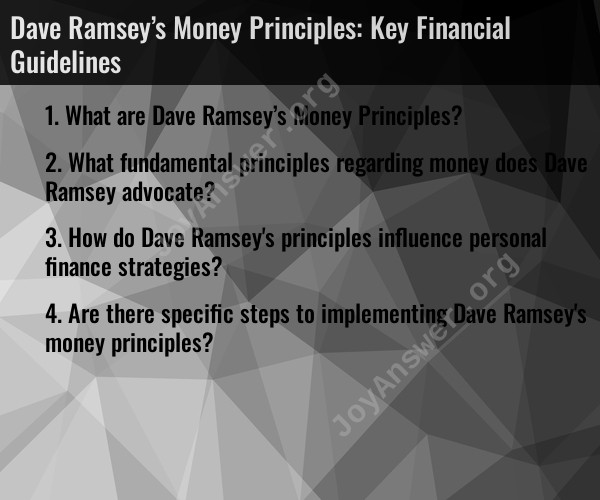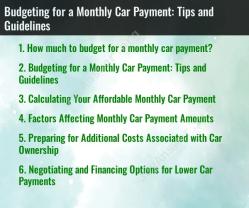What are Dave Ramsey’s Money Principles?
Dave Ramsey, a well-known personal finance expert, has several core principles that form the foundation of his financial philosophy. Some key principles advocated by Dave Ramsey include:
Live on a Budget: Creating and sticking to a monthly budget is crucial for managing money effectively. It involves tracking income and expenses, prioritizing spending, and ensuring every dollar has a purpose.
Get Out of Debt: Ramsey emphasizes the importance of getting out of debt by following his "Debt Snowball" method. This method involves paying off debts starting from the smallest to the largest, regardless of interest rates, to build momentum and motivation.
Emergency Fund: Building an emergency fund of three to six months' worth of expenses provides a financial safety net for unexpected expenses or job loss. This fund helps avoid going into debt in case of emergencies.
Cash is King: Ramsey advocates for using cash or debit cards instead of credit cards to avoid debt and overspending. He encourages the use of an envelope system for budgeting discretionary spending categories.
Investing for the Future: After becoming debt-free and building an emergency fund, Ramsey suggests investing at least 15% of household income into retirement accounts, such as 401(k)s and IRAs, for long-term wealth building.
Live Below Your Means: Spending less than what you earn is a key principle for financial stability. Ramsey encourages living a modest lifestyle and avoiding unnecessary expenses to achieve financial goals.
Avoid Cosigning Loans: Ramsey advises against cosigning loans, as it can lead to financial stress and strain relationships if the borrower defaults.
Insurance Protection: Ensuring adequate insurance coverage, including health insurance, life insurance, and disability insurance, is crucial to protect against unforeseen events and risks.
Giving and Generosity: Ramsey emphasizes the importance of giving back and being generous. He suggests allocating a portion of income for charitable giving to help others and foster a spirit of generosity.
These principles form the core of Dave Ramsey's financial advice and are aimed at helping individuals achieve financial freedom, eliminate debt, build wealth, and achieve financial peace. However, it's important to consider individual circumstances and adapt financial strategies to personal needs and goals.
What fundamental principles regarding money does Dave Ramsey advocate?
Dave Ramsey is a well-known financial personality who advocates for a set of fundamental principles regarding money. These principles are based on the idea that financial freedom is attainable for everyone, regardless of their income level or current financial situation. Ramsey's principles are designed to help people get out of debt, build wealth, and achieve financial peace of mind.
Here are some of the key principles of Dave Ramsey's financial philosophy:
Live on a budget: Ramsey believes that everyone should create a budget and track their spending in order to live within their means. He encourages people to eliminate unnecessary expenses and allocate their money towards debt repayment, savings, and investing.
Get out of debt: Ramsey advocates for paying off all debt, except for a mortgage, as quickly as possible. He encourages people to use a debt snowball method, which involves paying off debts smallest to largest, to gain momentum and stay motivated.
Save for emergencies: Ramsey recommends building an emergency fund of 3-6 months of living expenses to cover unexpected events, such as job loss or medical emergencies. This will help prevent people from going into debt when unexpected expenses arise.
Invest for the future: Ramsey encourages people to start investing early and regularly to grow their wealth for retirement and other long-term goals. He recommends investing in a diversified portfolio of stocks, bonds, and mutual funds.
Give generously: Ramsey believes in the importance of giving back to others and encourages people to donate to charities and causes they care about. He suggests budgeting for charitable giving and making it a regular part of their financial plan.
How do Dave Ramsey's principles influence personal finance strategies?
Dave Ramsey's principles can have a significant impact on personal finance strategies. By following his principles, people can make informed decisions about their money and take control of their financial future. Ramsey's principles can help individuals:
Develop financial discipline: Ramsey's emphasis on budgeting and debt repayment helps people develop financial discipline and make responsible choices about their spending and saving habits.
Achieve financial goals: By following Ramsey's principles, people can create a clear path to achieving their financial goals, whether it's saving for a down payment on a house, funding their retirement, or building a college fund for their children.
Reduce financial stress: Ramsey's approach to debt elimination and financial planning can help reduce financial stress and anxiety, allowing individuals to feel more confident and in control of their finances.
Build financial security: By following Ramsey's principles, people can build a solid financial foundation and achieve long-term financial security.
Are there specific steps to implementing Dave Ramsey's money principles?
Yes, there are specific steps that individuals can take to implement Dave Ramsey's money principles. Here's a step-by-step guide:
Create a budget: Track your income and expenses to understand where your money is going. Identify areas where you can cut back on spending.
Build an emergency fund: Save 3-6 months of living expenses to cover unexpected events. This will prevent you from going into debt when emergencies arise.
Pay off debt: Start paying off your debts, smallest to largest, using the debt snowball method. Make extra payments whenever possible to accelerate debt repayment.
Invest for the future: Once you're out of debt, start investing regularly to grow your wealth. Invest in a diversified portfolio of stocks, bonds, and mutual funds.
Give generously: Set aside a portion of your income for charitable giving and make it a regular habit.
Remember, implementing Dave Ramsey's principles takes time and effort. However, the long-term rewards of financial freedom and peace of mind are well worth it.












